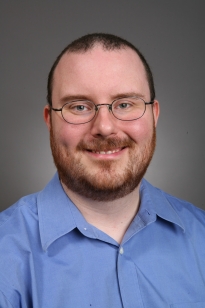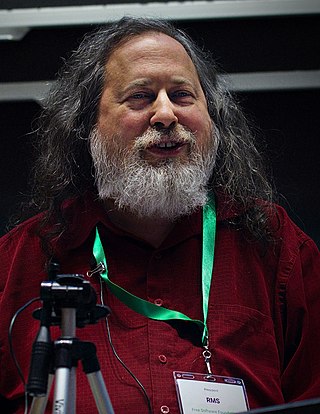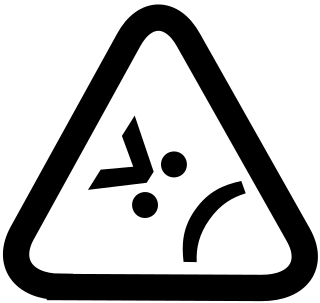
Free software or libre software is computer software distributed under terms that allow users to run the software for any purpose as well as to study, change, and distribute it and any adapted versions. Free software is a matter of liberty, not price; all users are legally free to do what they want with their copies of a free software regardless of how much is paid to obtain the program. Computer programs are deemed "free" if they give end-users ultimate control over the software and, subsequently, over their devices.

GNU is an extensive collection of free software, which can be used as an operating system or can be used in parts with other operating systems. The use of the completed GNU tools led to the family of operating systems popularly known as Linux. Most of GNU is licensed under the GNU Project's own General Public License (GPL).

The GNU Lesser General Public License (LGPL) is a free-software license published by the Free Software Foundation (FSF). The license allows developers and companies to use and integrate a software component released under the LGPL into their own software without being required by the terms of a strong copyleft license to release the source code of their own components. However, any developer who modifies an LGPL-covered component is required to make their modified version available under the same LGPL license. For proprietary software, code under the LGPL is usually used in the form of a shared library, so that there is a clear separation between the proprietary and LGPL components. The LGPL is primarily used for software libraries, although it is also used by some stand-alone applications.

Vorbis is a free and open-source software project headed by the Xiph.Org Foundation. The project produces an audio coding format and software reference encoder/decoder (codec) for lossy audio compression. Vorbis is most commonly used in conjunction with the Ogg container format and it is therefore often referred to as Ogg Vorbis.
DotGNU is a decommissioned part of the GNU Project that started in January 2001. DotGNU aims to provide a free software replacement for Microsoft's .NET Framework by Free Software Foundation. Other goals of the project are better support for non-Windows platforms and support for more processors.

The GNU Project is a free software, mass collaboration project announced by Richard Stallman on September 27, 1983. Its goal is to give computer users freedom and control in their use of their computers and computing devices by collaboratively developing and publishing software that gives everyone the rights to freely run the software, copy and distribute it, study it, and modify it. GNU software grants these rights in its license.

Free Software Foundation (FSF) grants two annual awards. Since 1998, FSF has granted the award for Advancement of Free Software and since 2005, also the Free Software Award for Projects of Social Benefit.

Georg C. F. Greve is a software developer, physicist, author and currently co-founder and president at Vereign. He has been working on technology politics since he founded the Free Software Foundation Europe (FSFE) in 2001.

Bradley M. Kuhn is a free software activist from the United States.

Richard Matthew Stallman, also known by his initials, rms, is an American free software movement activist and programmer. He campaigns for software to be distributed in such a manner that its users have the freedom to use, study, distribute, and modify that software. Software that ensures these freedoms is termed free software. Stallman launched the GNU Project, founded the Free Software Foundation (FSF) in October 1985, developed the GNU Compiler Collection and GNU Emacs, and wrote all versions of the GNU General Public License.
Tivoization is the practice of designing hardware that incorporates software under the terms of a copyleft software license like the GNU General Public License, but uses hardware restrictions or digital rights management (DRM) to prevent users from running modified versions of the software on that hardware. Richard Stallman of the Free Software Foundation (FSF) coined the term in reference to TiVo's use of GNU GPL licensed software on the TiVo brand digital video recorders (DVR), which actively block modified software by design. Stallman believes this practice denies users some of the freedom that the GNU GPL was designed to protect. The FSF refers to tivoized hardware as "proprietary tyrants".

Defective by Design (DBD) is an anti-DRM initiative by the Free Software Foundation. Digital rights management (DRM) technology restricts users' ability to freely use their purchased movies, music, literature, software, and hardware in ways they are accustomed to with ordinary non-restricted media. As a result, DRM has been described as "digital restrictions management" or "digital restrictions mechanisms" by opponents.
The Affero General Public License is a free software license. The first version of the Affero General Public License (AGPLv1), was published by Affero, Inc. in March 2002, and based on the GNU General Public License, version 2 (GPLv2). The second version (AGPLv2) was published in November 2007, as a transitional license to allow an upgrade path from AGPLv1 to the GNU Affero General Public License.
Free Software Foundation anti-Windows campaigns are the events targeted against a line of Microsoft Windows operating systems. They are paralleling the Defective by Design campaign against digital rights management technologies, but they instead target Microsoft's operating systems instead of DRM itself.

The GNU General Public License is a series of widely used free software licenses that guarantee end users the four freedoms to run, study, share, and modify the software. The license was the first copyleft for general use and was originally written by the founder of the Free Software Foundation (FSF), Richard Stallman, for the GNU Project. The license grants the recipients of a computer program the rights of the Free Software Definition. These GPL series are all copyleft licenses, which means that any derivative work must be distributed under the same or equivalent license terms. It is more restrictive than the Lesser General Public License and even further distinct from the more widely used permissive software licenses BSD, MIT, and Apache.

The GNU Free Documentation License is a copyleft license for free documentation, designed by the Free Software Foundation (FSF) for the GNU Project. It is similar to the GNU General Public License, giving readers the rights to copy, redistribute, and modify a work and requires all copies and derivatives to be available under the same license. Copies may also be sold commercially, but, if produced in larger quantities, the original document or source code must be made available to the work's recipient.
The Free Software Foundation (FSF) is a 501(c)(3) non-profit organization founded by Richard Stallman on October 4, 1985, to support the free software movement, with the organization's preference for software being distributed under copyleft terms, such as with its own GNU General Public License. The FSF was incorporated in Boston, Massachusetts, US, where it is also based.

Alexandre "Alex" Oliva, is a Brazilian free software activist, developer, former vice president of the board of directors of the Free Software Foundation (FSF) and founding member of Free Software Foundation Latin America (FSFLA). He is currently on-hold from his PhD studies at the Institute of Computing of the State University of Campinas, Brazil whilst working as a compiler engineer at Red Hat, contributing in the GCC compiler. He is the maintainer of Linux-libre, a fork of the Linux kernel which removes non-free software components, such as binary blobs from the kernel. The Linux-libre kernels are used in Linux distributions such as Parabola GNU/Linux-libre, gNewSense, and Trisquel, all of which are recommended by the Free Software Foundation and the GNU Project.
GNU LibreDWG is a software library programmed in C to manage DWG computer files, native proprietary format of computer-aided design software AutoCAD. It aims to be a free software replacement for the OpenDWG libraries. The project is managed by the Free Software Foundation (FSF).
LibrePlanet is a community project created and supported by the Free Software Foundation. Its objective is the promotion of free software around the world by bringing every year an international conference to local communities and organizations.














